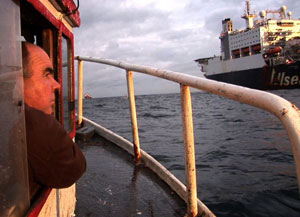A documentary film that looks at the most controversial environmental issue in recent Irish history will be shown at the University of St. Thomas at 2 p.m. Sunday, March 4 in Room 102 of the university’s O’Shaughnessy-Frey Library Center.
The program, free and open to the public, is co-sponsored by the university’s Center for Irish Studies, Department of Political Science, Environmental Studies Program, and the Havel Civil Society Symposium.
“The Pipe,” a 2009 film directed by Risteard O Domhnaill, has been shown at film festivals in Toronto, London, and elsewhere. It won the grand prize at the Ile-de-France Environmental Film Festival and was named best documentary by the Irish Film and Television Academy and the Celtic Media Festival. This is its Minnesota premiere.
A trailer for the documentary can be viewed here:
The screening will be followed by refreshments and a panel discussion with Irish citizens and environmental activists. Leading the discussion will be this year’s Havel Scholar, Harry Boyte, a senior fellow at the University of Minnesota’s Humphrey School of Public Affairs and director of Augsburg College’s Center for Democracy and Citizenship, which promotes active citizenship and public work by people of all ages.
Boyte also is director of the American Commonwealth Project, a higher education initiative by a variety of groups in partnership with the Department of Education to strengthen the public purposes and democracy mission of colleges and universities.
“The Pipe” traces a controversy that began in 2005 when Shell Oil announced plans to run a natural gas pipeline from an offshore site in western County Mayo to an inland distribution center. The project was resisted by fishermen and others in the small community of Rossport; they organized protests that came to be known as the Shell-to-Shore Campaign. Many protesters were fined and jailed for their civil disobedience.
“The Pipe” follows the lives of four members of the community as they experience disruptions and anxiety during the early phases of the pipeline project. Their traditional jobs of farming and fishing are disturbed by the plans, but other changes follow. For instance, the local police find themselves caught between their neighbors and corporate interests, and the community itself grew deeply divided about how to proceed.
The protester who receives the most attention is fisherman Pat O’Donnell, who defiantly runs his small fishing boat in front of the enormous Shell vessel laying the pipeline.
The Havel Civil Society Symposium, a partnership between St. Thomas and House of Hope Presbyterian Church in cooperation with the Minnesota Czech and Slovak communities, was established in 1999 to encourage discussion on the rights and responsibilities of citizens.
For more information about the March 4 program, contact Jim Rogers, director of St. Thomas’ Center for Irish Studies, (651) 962-5662 or jrogers@stthomas.edu.








